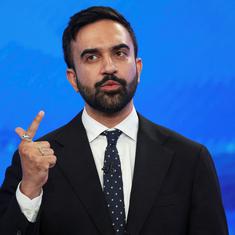The Big Story: Temporary reprieve
Imminent elections seem to have acted as an incentive in Manipur, where the Centre has stepped in to mediate between the state government and the United Naga Council in the hope of calling off the economic blockade that has lasted more than three months. Manipur Chief Minister Okram Ibobi Singh confirmed on Monday that the United Naga Council would lift its blockade, while the state government unconditionally releases two United Naga Council members it had jailed.
The end of the blockade is good news for the people of the hilly state, especially since the protests also coincided with the Centre’s demonetisation move and its delibilitating consequences. The cost was immediately evident in oil and cooking gas prices, which shot up astronomically because of the disrupted supply line. As the blockade comes to an end, the underground economy that supported these prices should recede.
But this positive outcome ahead of state elections, which take place later this month, is actually a symptom of a growing divide. The blockade was put in place because the United Naga Council believed the Congress government’s decision to carve up new districts in the state, which happened without consulting the hill-inhabiting Naga tribes, would only entrench the power of the Meiteis who dominate Manipur’s valleys.
The state’s ethnic and territorial divide is longstanding. But the Congress seems to have decided that it will focus entirely on the Meitei vote, prompting the United Naga Council to risk imposing a crushing blockade months ahead of elections. The Bharatiya Janata Party-ruled Centre will take credit for ending the blockade, but its eyes are also fixed on strategies to take advantage of this divide and earning the support of Naga voters in the hill districts.
The end of the blockade is a positive step, but if the upcoming election ends up confirming that the ethnic divide has indeed become a political one as well, it might be a sign that things are about to get worse for Manipuris.
The Big Scroll
- In search of a face-saver in Manipur: Ipsita Chakravarty writes on how everybody loves a rift that yields rich political dividends.
- Ipsita Chakravarty also checked in on the 70th day of the Manipur blockade.
- Shoaib Daniyal gives you a preview of the upcoming elections in the state.
Subscribe to “The Daily Fix” by either downloading Scroll’s Android app or opting for it to be delivered to your mailbox. If you have thoughts or suggestions about the Fix, please email rohan@scroll.in. If you have any concerns about our coverage of particular issues, please write to the Readers’ Editor at readerseditor@scroll.in.
Punditry
- By awkwardly forcing her way to the top, Tamil Nadu’s next chief minister, VK Sasikala risks weakening the AIADMK and inviting popular resistance, says a leader in the Hindu.
- Monalisa Changkija in the Indian Express says the opposition to 33% women’s reservation in Nagaland’s urban local bodies should dispel all illusions about tribal society being simple and truly democratic.
- The newly formed Monetary Policy Committee needs to finds its feet quickly and understand its role in helping run the Indian economy, writes Rajeev Malik in Mint.
- “Every few weeks I get a phone call or text message informing me that yet another journalist, political activist or someone hyperactive on social media has gone missing,” writes Mohammed Hanif in the New York Times. “From past experience I know that they have most likely been picked up by one of the secret agencies. I also know that when they return they’ll be changed people.”
- Tadit Kundu in Mint looks at whether the spending patterns of the United Progressive Alliance and the National Democratic Alliance show any radical differences.
- Disenchantment with globalisation is growing just as the World Trade Organisation’s evolution has pushed a wedge between developing and developed nations. That represents an opportunity to re-wire the WTO writes Biswajit Dhar in the Hindu.
- Matthew Yglesias in Vox says that while it may not be immediately apparent, all the protests against US President Donald Trump’s moves are having an effect. “Not only have the resisters already markedly altered the trajectory of public policy, they have also begun to make a difference in each other’s lives and their own conceptions of themselves. And this is the greatest threat to the Trump movement.”
Giggles
#ChinnammaToBeCM #SasikalaShortCut #SasikalaNatarajan #AIADMK #sasikala My #cartoon pic.twitter.com/zgH2HdI2Vs
— MANJUL (@MANJULtoons) February 7, 2017
Don’t miss
Naveen Nair reports on Kerala church authorities trying to get people married off and stop using birth control, because they are worried about dwindling flocks.
“Though Bishop Mar Remigiose Inchananiyil would want society to believe that a growing number of unmarried male members within its fold is the reason behind such a message, the dwindling number of Christians in the state has certainly got the Church brass worried and may have more to do with it. The clergy is not willing to admit to this though. ‘Obviously, there is concern about falling numbers, but we had known that for some time now,’’ said Father Abraham Kavilpurayidathil, the spokesperson for the bishop. ‘Even when people were accusing us of conversion, actually our numbers were going down. This decision is not based on that concern alone.’
He went on to say, ‘This decision was taken after studying an existing social problem. We have more than 1,700 unmarried men in the range of 33 years to 35 years of age. For them, marriage will be a distant dream as getting a bride from the community is close to impossible.’ He added, ‘This number has been rising at an alarming rate and the bishop only wanted to suggest a remedy for it.’”










